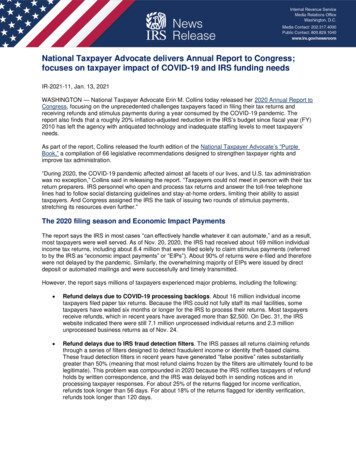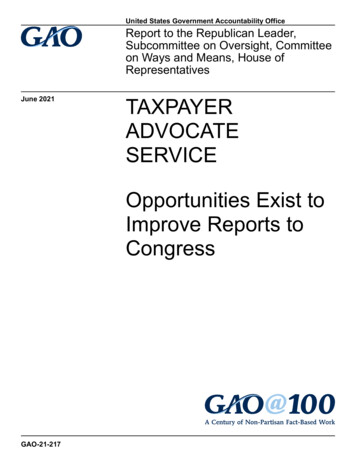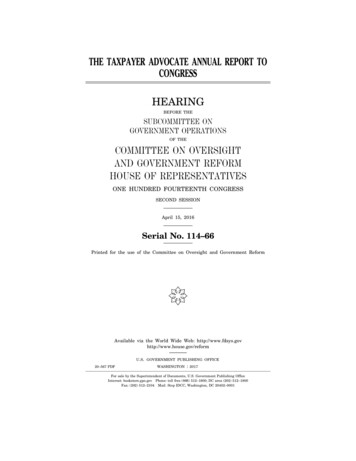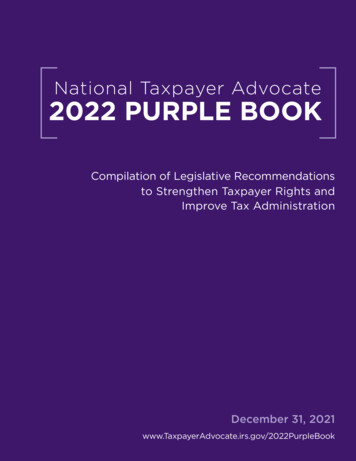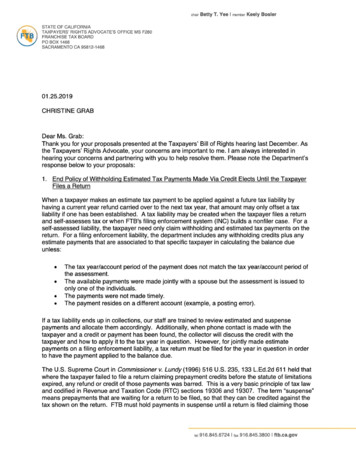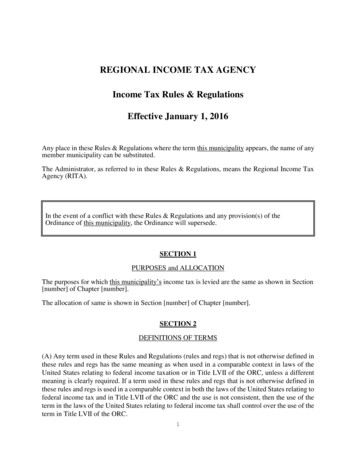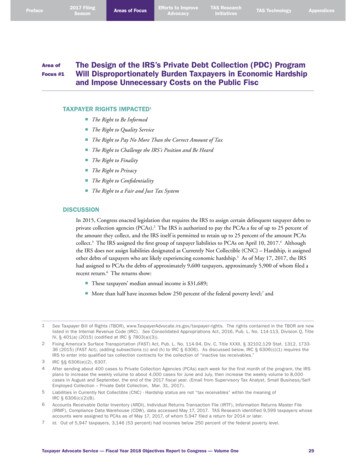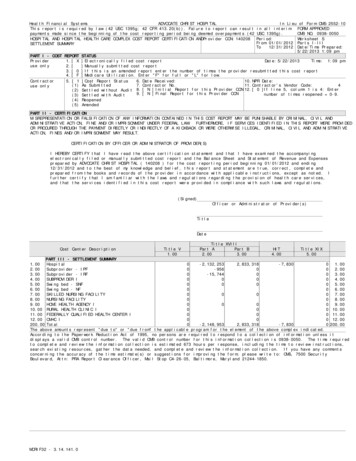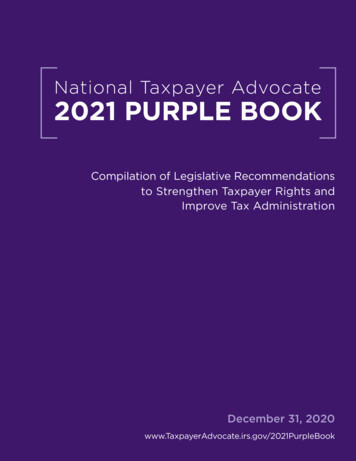
Transcription
National Taxpayer Advocate2021 PURPLE BOOKCompilation of Legislative Recommendations to Strengthen Taxpayer Rights andImprove Tax AdministrationDecember 31, 2020www.TaxpayerAdvocate.irs.gov/2021PurpleBook
Table of ContentsTable of ContentsINTRODUCTION . . . . . . . . . . . . . . . . . . . . . . . . . . . . . . . . . . . . . . . . . . . . . . . . . . . . . . . . . . . . . . . . . . . . . .vSTRENGTHEN TAXPAYER RIGHTS AND TAXPAYER SERVICE1.Elevate the Importance of the Taxpayer Bill of Rights by Redesignating It as Section1 of the Internal Revenue Code . . . . . . . . . . . . . . . . . . . . . . . . . . . . . . . . . . . . . . . . . . . . . . . . . . . . 12. Revamp the IRS Budget Structure and Provide Sufficient Funding to Improve theTaxpayer Experience and Modernize the IRS's Information Technology Systems . . . . . . . . . 3IMPROVE THE FILING PROCESS3. Authorize the IRS to Establish Minimum Competency Standards for Federal TaxReturn Preparers . . . . . . . . . . . . . . . . . . . . . . . . . . . . . . . . . . . . . . . . . . . . . . . . . . . . . . . . . . . . . . . . 74. Set Goals for Substantially Increasing the Use of the Free File Program by FilingSeason 2025 and Replace Free File If Those Goals Are Not Attained . . . . . . . . . . . . . . . . . . . 115. Require the IRS to Work With Tax Software Companies to Incorporate ScanningTechnology for Individual Income Tax Returns Prepared Electronically But Filedon Paper. . . . . . . . . . . . . . . . . . . . . . . . . . . . . . . . . . . . . . . . . . . . . . . . . . . . . . . . . . . . . . . . . . . . . . . 146. Treat Electronically Submitted Tax Payments and Documents as Timely IfSubmitted Before the Applicable Deadline . . . . . . . . . . . . . . . . . . . . . . . . . . . . . . . . . . . . . . . . . 167.Extend the Time for Small Businesses to Make Subchapter S Elections . . . . . . . . . . . . . . . . 188. Adjust Individual Estimated Tax Payment Deadlines to Occur Quarterly . . . . . . . . . . . . . . . . 209. Harmonize Reporting Requirements for Taxpayers Subject to Both the Report ofForeign Bank and Financial Accounts and the Foreign Account Tax Compliance Actby Eliminating Duplication and Excluding Accounts a U.S. Person Maintains in theCountry Where He or She Is a Bona Fide Resident . . . . . . . . . . . . . . . . . . . . . . . . . . . . . . . . . . 2110. Adjust the Filing Threshold for Taxpayers Filing as Married Filing Separately andNonresident Alien Individuals . . . . . . . . . . . . . . . . . . . . . . . . . . . . . . . . . . . . . . . . . . . . . . . . . . . . 23IMPROVE ASSESSMENT AND COLLECTION PROCEDURES11. Continue to Limit the IRS’s Use of “Math Error Authority” to Clear-Cut CategoriesSpecified by Statute . . . . . . . . . . . . . . . . . . . . . . . . . . . . . . . . . . . . . . . . . . . . . . . . . . . . . . . . . . . . 2512. Require Independent Managerial Review and Written Approval Before the IRS MayAssert Multiyear Bans Barring Taxpayers From Receiving Certain Tax Credits andClarify That the Tax Court Has Jurisdiction to Review the Assertion of Multiyear Bans . . . 2813. Allow Additional Time for Taxpayers to Request Abatement of a Math ErrorAssessment Equal to the Additional Time Allowed to Respond to a Notice ofDeficiency When the Math Error Notice Is Addressed to a Person Outside theUnited States . . . . . . . . . . . . . . . . . . . . . . . . . . . . . . . . . . . . . . . . . . . . . . . . . . . . . . . . . . . . . . . . . . 3114. Require the IRS to Waive User Fees for Taxpayers Who Enter Into Low-CostInstallment Agreements . . . . . . . . . . . . . . . . . . . . . . . . . . . . . . . . . . . . . . . . . . . . . . . . . . . . . . . . . 33National Taxpayer Advocate 2021 Purple Booki
Table of Contents15. Improve Offer in Compromise Program Accessibility by Repealing the PartialPayment Requirement and Restructuring the User Fee . . . . . . . . . . . . . . . . . . . . . . . . . . . . . . 3416. Modify the Requirement That the Office of Chief Counsel Review Certain Offers inCompromise . . . . . . . . . . . . . . . . . . . . . . . . . . . . . . . . . . . . . . . . . . . . . . . . . . . . . . . . . . . . . . . . . . . 3617. Amend IRC § 7122 to Require the IRS to Refund Any Payment Collected Pursuant toa Federal Tax Lien That Exceeds the Amount of an Accepted Offer in Compromise . . . . . . 3818. Require the IRS to Mail Notices at Least Quarterly to Taxpayers With DelinquentTax Liabilities . . . . . . . . . . . . . . . . . . . . . . . . . . . . . . . . . . . . . . . . . . . . . . . . . . . . . . . . . . . . . . . . . . 4019. Clarify When the Two-Year Period for Requesting Return of Levy Proceeds Begins . . . . . . 4120. Protect Retirement Funds From IRS Levies, Including So-Called “Voluntary” Levies,in the Absence of “Flagrant Conduct” by a Taxpayer . . . . . . . . . . . . . . . . . . . . . . . . . . . . . . . . 4321. Toll the Time Periods for Requesting the Return of Levy Proceeds While theTaxpayer or a Pertinent Third Party Is Financially Disabled . . . . . . . . . . . . . . . . . . . . . . . . . . . 4522. Provide Taxpayer Protections Before the IRS Recommends the Filing of a LienForeclosure Suit on a Principal Residence . . . . . . . . . . . . . . . . . . . . . . . . . . . . . . . . . . . . . . . . . 4723. Provide Collection Due Process Rights to Third Parties Holding Legal Title toProperty Subject to IRS Collection Actions . . . . . . . . . . . . . . . . . . . . . . . . . . . . . . . . . . . . . . . . . 4924. Extend the Time Limit for Taxpayers to Sue for Damages for Improper CollectionActions . . . . . . . . . . . . . . . . . . . . . . . . . . . . . . . . . . . . . . . . . . . . . . . . . . . . . . . . . . . . . . . . . . . . . . . 5125. Direct the IRS to Implement an Automated Formula to Identify Taxpayers at Risk ofEconomic Hardship . . . . . . . . . . . . . . . . . . . . . . . . . . . . . . . . . . . . . . . . . . . . . . . . . . . . . . . . . . . . . 5326. Revise the Private Debt Collection Rules to Eliminate the Taxpayers Intended to BeExcluded by the Taxpayer First Act . . . . . . . . . . . . . . . . . . . . . . . . . . . . . . . . . . . . . . . . . . . . . . . 55REFORM PENALTY AND INTEREST PROVISIONS27. Convert the Estimated Tax Penalty Into an Interest Provision to Properly ReflectIts Substance . . . . . . . . . . . . . . . . . . . . . . . . . . . . . . . . . . . . . . . . . . . . . . . . . . . . . . . . . . . . . . . 5728. Apply One Interest Rate Per Estimated Tax Underpayment Period . . . . . . . . . . . . . . . . . . . . . 5929. Pay Interest on Estimated Tax Overpayments, Allowing Taxpayers to Help Financethe National Debt While Promoting Tax Compliance and Savings . . . . . . . . . . . . . . . . . . . . . . 6030. Reduce the Federal Tax Deposit Penalty Imposed on Taxpayers Who Make TimelyTax Deposits . . . . . . . . . . . . . . . . . . . . . . . . . . . . . . . . . . . . . . . . . . . . . . . . . . . . . . . . . . . . . . . . . . . 6231. Extend Reasonable Cause Defense for the Failure-to-File Penalty to TaxpayersWho Rely on Return Preparers to e-File Their Returns . . . . . . . . . . . . . . . . . . . . . . . . . . . . . . . 6332. Authorize a Penalty for Tax Return Preparers Who Engage in Fraud or Misconductby Altering a Taxpayer’s Tax Return . . . . . . . . . . . . . . . . . . . . . . . . . . . . . . . . . . . . . . . . . . . . . . . 6633. Clarify That Supervisory Approval Is Required Under IRC § 6751(b) BeforeProposing Penalties . . . . . . . . . . . . . . . . . . . . . . . . . . . . . . . . . . . . . . . . . . . . . . . . . . . . . . . . . . . . 68iiTable of Contents
Table of Contents34. Require an Employee to Determine and a Supervisor to Approve All NegligencePenalties Under IRC § 6662(b)(1) . . . . . . . . . . . . . . . . . . . . . . . . . . . . . . . . . . . . . . . . . . . . . . . . . 7135. Modify the Definition of 'Willful' for Purposes of Finding FBAR Violations andReduce the Maximum Penalty Amounts . . . . . . . . . . . . . . . . . . . . . . . . . . . . . . . . . . . . . . . . . . . 73STRENGTHEN TAXPAYER RIGHTS BEFORE THE OFFICE OF APPEALS36. Require That at Least One Appeals Officer and One Settlement Officer Be Locatedand Permanently Available in Each State, the District of Columbia, and Puerto Rico . . . . . . 7637. Require Taxpayers’ Consent Before Allowing IRS Counsel or Compliance Personnelto Participate in Appeals Conferences . . . . . . . . . . . . . . . . . . . . . . . . . . . . . . . . . . . . . . . . . . . . . 78STRENGTHEN THE OFFICE OF THE TAXPAYER ADVOCATE38. Clarify That the National Taxpayer Advocate May Hire Legal Counsel to Enable Herto Advocate More Effectively for Taxpayers . . . . . . . . . . . . . . . . . . . . . . . . . . . . . . . . . . . . . . . . 8039. Clarify the Authority of the National Taxpayer Advocate to Make PersonnelDecisions to Protect the Independence of the Office of the Taxpayer Advocate . . . . . . . . . 8340. Clarify the Taxpayer Advocate Service’s Access to Files, Meetings, and OtherInformation . . . . . . . . . . . . . . . . . . . . . . . . . . . . . . . . . . . . . . . . . . . . . . . . . . . . . . . . . . . . . . . . . . . . 8541. Authorize the National Taxpayer Advocate to File Amicus Briefs . . . . . . . . . . . . . . . . . . . . . . 8742. Require the IRS to Address the National Taxpayer Advocate’s Comments inFinal Rules . . . . . . . . . . . . . . . . . . . . . . . . . . . . . . . . . . . . . . . . . . . . . . . . . . . . . . . . . . . . . . . . . . . . 8943. Authorize the Office of the Taxpayer Advocate to Assist Certain Taxpayers During aLapse in Appropriations . . . . . . . . . . . . . . . . . . . . . . . . . . . . . . . . . . . . . . . . . . . . . . . . . . . . . . . . . 9044. Repeal Statute Suspension Under IRC § 7811(d) for Taxpayers Seeking AssistanceFrom the Taxpayer Advocate Service . . . . . . . . . . . . . . . . . . . . . . . . . . . . . . . . . . . . . . . . . . . . . . 92STRENGTHEN TAXPAYER RIGHTS IN JUDICIAL PROCEEDINGS45. Repeal Flora and Expand the Tax Court’s Jurisdiction, Giving Taxpayers WhoCannot Pay the Same Access to Judicial Review as Those Who Can . . . . . . . . . . . . . . . . . . . 9446. Authorize the Tax Court to Order Refunds or Credits in Collection Due ProcessProceedings Where Liability Is at Issue . . . . . . . . . . . . . . . . . . . . . . . . . . . . . . . . . . . . . . . . . . . . 9847. Provide That the Time Limits for Bringing Tax Litigation Are Subject to the JudicialDoctrines of Forfeiture, Waiver, Estoppel, and Equitable Tolling . . . . . . . . . . . . . . . . . . . . . . 10048. Amend IRC § 7456(a) to Authorize the Tax Court to Sign Subpoenas for theProduction of Records Held by a Third Party Prior to a Scheduled Hearing . . . . . . . . . . . . 10349. Provide That the Scope of Judicial Review of Determinations Under IRC § 6015 IsDe Novo . . . . . . . . . . . . . . . . . . . . . . . . . . . . . . . . . . . . . . . . . . . . . . . . . . . . . . . . . . . . . . . . . . . . . . 10550. Clarify That Taxpayers May Raise Innocent Spouse Relief as a Defense in CollectionProceedings and Bankruptcy Cases . . . . . . . . . . . . . . . . . . . . . . . . . . . . . . . . . . . . . . . . . . . . . . 10851. Clarify That Taxpayers May Seek Innocent Spouse Relief in Refund Suits . . . . . . . . . . . . . 110National Taxpayer Advocate 2021 Purple Bookiii
Table of Contents52. Fix the Donut Hole in the Tax Court’s Jurisdiction to Determine Overpayments byNon-Filers With Filing Extensions . . . . . . . . . . . . . . . . . . . . . . . . . . . . . . . . . . . . . . . . . . . . . . . . 112MISCELLANEOUS RECOMMENDATIONS53. Restructure the Earned Income Tax Credit (EITC) to Make It Simpler for Taxpayersand Reduce Improper Payments . . . . . . . . . . . . . . . . . . . . . . . . . . . . . . . . . . . . . . . . . . . . . . . . . 11554. Provide Earned Income Tax Credit (EITC) Relief During National Disasters . . . . . . . . . . . . . 12055. Exclude Taxpayers in Specific Circumstances From the Requirement to Provide aSocial Security Number for Their Children to Claim the Child Tax Credit . . . . . . . . . . . . . . . 12256. Clarify Whether Dependents Are Required to Have Taxpayer IdentificationNumbers for Purposes of the Credit for Other Dependents . . . . . . . . . . . . . . . . . . . . . . . . . . 12457. Allow Members of Certain Religious Sects That Do Not Participate in SocialSecurity and Medicare to Obtain Employment Tax Refunds . . . . . . . . . . . . . . . . . . . . . . . . . . 12758. Amend IRC § 36B(d)(2) to Prevent Individuals From Losing Some or All of TheirPremium Tax Credits When Receiving Lump-Sum Social Security BenefitsAttributable to a Prior Year . . . . . . . . . . . . . . . . . . . . . . . . . . . . . . . . . . . . . . . . . . . . . . . . . . . . . . 12959. Amend IRC §§ 108(a) and 6050P to Provide That Gross Income Does Not Include,and the Department of Education Is Not Required to Report, Income From theCancellation of Student Loans Under the Coronavirus Aid, Relief and EconomicSecurity Act . . . . . . . . . . . . . . . . . . . . . . . . . . . . . . . . . . . . . . . . . . . . . . . . . . . . . . . . . . . . . . . . . . 13160. Amend the Combat-Injured Veterans Tax Fairness Act of 2016 to Allow Veterans ofthe Coast Guard to Exclude Disability Severance Pay From Gross Income and FileClaims for Credit or Refund for Taxes Withheld From Excluded Income . . . . . . . . . . . . . . . 13361. Encourage and Authorize Independent Contractors and Service Recipients to EnterInto Voluntary Withholding Agreements . . . . . . . . . . . . . . . . . . . . . . . . . . . . . . . . . . . . . . . . . . 13562. Require the IRS to Specify the Information Needed in Third-Party Contact Notices . . . . . 13763. Authorize the Treasury Department to Issue Guidance Specific to IRC § 6713Regarding the Disclosure or Use of Tax Return Information by Preparers . . . . . . . . . . . . . . 13964. Increase the Individual Low Income Taxpayer Clinic Grant Cap and Index It forInflation . . . . . . . . . . . . . . . . . . . . . . . . . . . . . . . . . . . . . . . . . . . . . . . . . . . . . . . . . . . . . . . . . . . . . . 14165. Compensate Taxpayers for “No Change” National Research Program Audits . . . . . . . . . . 14366. Establish the Position of IRS Historian Within the Internal Revenue Service toRecord and Publish Its History . . . . . . . . . . . . . . . . . . . . . . . . . . . . . . . . . . . . . . . . . . . . . . . . . . 145APPENDIX 1Additional Reference Materials for Legislative Recommendations in This Volume . . . . . . . 147APPENDIX 2Prior National Taxpayer Advocate Legislative Recommendations Enacted Into Law . . . . . 156ivTable of Contents
IntroductionNational Taxpayer Advocate 2021 Purple BookCompilation of Legislative Recommendations to StrengthenTaxpayer Rights and Improve Tax AdministrationINTRODUCTIONSection 7803(c)(2)(B)(ii)(IX) of the IRC requires the National Taxpayer Advocate, as part of the annual reportto Congress, to propose legislative recommendations to resolve problems encountered by taxpayers. This year,we present 66 legislative recommendations.We have taken the following steps to make these recommendations as accessible and user-friendly as possiblefor Members of Congress and their staffs: We have consolidated our recommendations from various sections of this year’s report, prior reports, andother sources into this single volume. We have grouped our recommendations into categories that generally reflect the various stages in the taxadministration process so that, for example, return filing issues are presented separately from audit andcollection issues. We have presented each legislative recommendation in a format like the one used for congressionalcommittee reports, with “Present Law,” “Reasons for Change,” and “Recommendation(s)” sections. Where bills have been introduced in the past that are generally consistent with a recommendation,we have included a footnote at the end of the recommendation that identifies those bills. (Because ofthe large number of bills introduced in each Congress, we almost surely have overlooked some. Weapologize for any bills we have inadvertently omitted.) We have compiled a table, which appears at the end of this volume as Appendix 1, that identifiesadditional materials relating to our recommendations, where such materials exist. In addition toidentifying a larger number of prior bills than we cite in our footnotes, the table provides references tomore detailed issue discussions that have been included in prior National Taxpayer Advocate reports.By our count, Congress has enacted approximately 46 legislative recommendations that the National TaxpayerAdvocate has proposed. See Appendix 2 for a complete listing. That total includes approximately 23provisions that were included as part of the Taxpayer First Act.1The Office of the Taxpayer Advocate is a non-partisan, independent organization within the IRS thatadvocates for the interests of taxpayers. We have dubbed this the “Purple Book” because the color purple, asa mix of red and blue, has come to symbolize bipartisanship. Historically, tax administration legislation hasattracted bipartisan support. Most recently, the Taxpayer First Act was approved by both the House and theSenate on voice votes with no recorded opposition.We believe most of the recommendations presented in this volume are non-controversial, common sensereforms that will strengthen taxpayer rights and improve tax administration. We hope the tax-writingcommittees and other Members of Congress find it useful.We highlight the following ten legislative recommendations for particular attention: Provide the IRS with sufficient funding to meet taxpayer needs and improve tax compliance.Since fiscal year (FY) 2010, the IRS’s budget has been reduced by about 20 percent after adjusting forNational Taxpayer Advocate 2021 Purple Bookv
Introduction viinflation. As a result, the IRS has been unable to meet taxpayer needs (e.g., the IRS received over 100million telephone calls in FY 2020, yet employees were only able to answer about 24 percent). TheIRS also has been unable to modernize its information technology (IT) systems. Antiquated IT, inturn, limits the ability of customer service representatives to effectively assist taxpayers and prevents theIRS from offering fully functional online taxpayer accounts. In FY 2020, the IRS collected about 3.5trillion on a budget of about 11.51 billion, producing a remarkable return on investment of more than300:1. Thus, additional funding for the IRS would not only improve taxpayer service but would almostsurely increase revenue collection as well.Authorize the IRS to establish minimum competency standards for federal tax return preparers.Most taxpayers rely on paid preparers to prepare their returns, yet the Government AccountabilityOffice, the Treasury Inspector General for Tax Administration, and other entities have found thatpreparers make significant errors that can harm both taxpayers and the public fisc. The IRS sought toimplement minimum standards for tax return preparers beginning in 2011, including requiring noncredentialed preparers to pass a basic competency test. However, a federal court held the IRS couldnot implement key components of its plan without statutory authorization. The IRS’s plan was wellthought-out, having been developed after extensive consultation with stakeholders. Minimum preparerstandards are still needed to protect taxpayers and improve tax compliance. Statutory authorizationwould allow the IRS to implement them.Expand the U.S. Tax Court’s jurisdiction to hear refund cases. Under current law, taxpayers who owetax and wish to litigate a dispute with the IRS must go to the U.S. Tax Court, while taxpayers who havepaid their tax and are seeking a refund must file suit in a U.S. district court or the U.S. Court of FederalClaims. All taxpayers should have the option to litigate their tax disputes in the U.S. Tax Court. TaxCourt judges are specialists, so they understand the nuances of complex tax issues more clearly, and theyare well-accustomed to working with unrepresented taxpayers.Restructure the Earned Income Tax Credit (EITC) to make it simpler for taxpayers and reduceimproper payments. TAS has long advocated for dividing the EITC into two separate credits: (i) arefundable worker credit based on each individual worker’s earned income, irrespective of the presenceof a qualifying child, and (ii) a refundable child credit that would reflect the costs of caring for one ormore children. For wage earners, claims for the worker credit could be verified with nearly 100 percentaccuracy by matching income information on tax returns against Forms W-2, thereby reducing theimproper payments rate on those claims to nearly zero. The portion of the EITC that varies based onfamily size would be combined with the child tax credit into a single family credit.Increase the annual award cap for Low Income Taxpayer Clinics (LITCs). When the LITC matchinggrant program was established as part of the IRS Restructuring and Reform Act of 1998 (RRA 98),IRC § 7526 limited annual grants to no more than 100,000 per clinic. The cap was not indexed forinflation, and as a result, the per-clinic grant maximum is now much lower in real-dollar terms. In lightof the significant value LITCs provide, we are recommending that Congress increase the per-clinic cap toat least 150,000 and then index it to rise with inflation.Clarify that supervisory approval is required before the IRS imposes certain penalties.IRC § 6751(b)(1) states: “No penalty under this title shall be assessed unless the initial determinationof such assessment is personally approved (in writing) by the immediate supervisor of the individualmaking such determination.” While it may appear requiring that an “initial determination” beapproved by a supervisor would mean the approval must occur before the penalty is proposed, thetiming of this requirement has been the subject of considerable litigation. Therefore, to effectuateCongress’s intent that the IRS not penalize taxpayers in certain circumstances without supervisoryapproval, the approval should be required earlier in the process. We recommend that Congress amendIntroduction
Introduction IRC § 6751(b)(1) to require that written supervisory approval be provided before the IRS sends a writtencommunication to a taxpayer proposing a penalty.Require taxpayer consent before allowing IRS Counsel or Compliance personnel to participatein an Independent Office of Appeals conference. Historically, the IRS’s Counsel and Compliancefunctions provided input into Appeals conferences via the taxpayer case file and, if the case wasparticularly large or complex, at a pre-conference. However, Counsel and Compliance generally didnot attend Appeals conferences with taxpayers, leaving taxpayers and Appeals Officers free to developrapport, seek common ground, and pursue case resolution. In October 2016, Appeals revised provisionsof the Internal Revenue Manual to allow Appeals Officers to include personnel from Counsel andCompliance in taxpayer conferences as a matter of routine. In our view, this has compromised the valueof the Independent Office of Appeals and is inconsistent with Congress’s intent to “reassure taxpayers ofthe independence” of Appeals. We recommend that Congress require explicit taxpayer consent regardingthe inclusion of Counsel or Compliance personnel in advance of any conference between Appeals and ataxpayer.Clarify that taxpayers may raise innocent spouse relief as a defense in collection proceedings andbankruptcy cases. Congress has enacted rules to relieve “innocent spouses” from joint and severalliability in certain circumstances. If the IRS denies a taxpayer’s request for innocent spouse relief, thetaxpayer generally may seek review of the adverse determination in the Tax Court. However, the TaxCourt does not have jurisdiction over collection suits arising under IRC §§ 7402 or 7403, or overbankruptcy proceedings arising under Title 11 of the U.S. Code. Courts have reached inconsistentdecisions about whether taxpayers may raise innocent spouse relief as a defense in those categories ofcases, undermining the innocent spouse protections and potentially resulting in differing treatment ofsimilarly situated taxpayers. We recommend Congress clarify that taxpayers may raise innocent spouseclaims in all such proceedings.Amend the Combat-Injured Veterans Tax Fairness Act of 2016 to allow veterans of the Coast Guardto file claims for credit or refund of taxes improperly withheld from disability severance pay (DSP).The 2016 Act created an exception from the statute of limitations to allow otherwise time-barred refundsin cases where the Secretary of Defense wrongfully withheld tax from severance payments to woundedveterans. Although the tax code’s definition of “military or naval forces of the United States” includesthe Coast Guard, the Act as drafted excluded veterans of the Coast Guard from its scope. It appears thatomitting the Coast Guard from the DSP tax relief provision may have resulted from a drafting error.Like members of the services within the Department of Defense, members of the Coast Guard often faceperilous circumstances and potential injuries as they perform their mandated duties. While the numberof veterans affected by this issue is relatively small, fairness and parity in treatment among the armedforces of the United States require that this apparent drafting error be corrected, and that a claims periodbe opened for this group of taxpayers.Clarify that the National Taxpayer Advocate may hire independent legal counsel. IRC § 7803(c)requires the National Taxpayer Advocate to operate independently of the IRS in key respects. Tohelp ensure this independence, the conference committee report accompanying RRA 98 stated: “Theconferees intend that the National Taxpayer Advocate be able to hire and consult counsel as appropriate.”This is similar to the authority Congress has granted inspectors general to ensure their independence.Until 2015, the National Taxpayer Advocate was able to hire attorneys to advise her, advocate fortaxpayers, and write key sections of her two statutorily-mandated reports to Congress. But the TreasuryDepartment at that time began to enforce a Departmentwide policy that requires all attorney-advisorsin the Department to report to the General Counsel absent a statutory exception. To continue toNational Taxpayer Advocate 2021 Purple Bookvii
Introductionadvocate for taxpayers effectively and independently, the National Taxpayer Advocate requires statutoryauthorization to hire attorney-advisors who do not report to other agency officials.viiiIntroduction
Strengthen Taxpayer Rights and Taxpayer ServiceSTRENGTHEN TAXPAYER RIGHTS AND TAXPAYER SERVICELegislative Recommendation #1Elevate the Importance of the Taxpayer Bill of Rights byRedesignating It as Section 1 of the Internal Revenue CodePRESENT LAWIRC § 7803(a)(3) requires the Commissioner to “ensure that employees of the Internal Revenue Service arefamiliar with and act in accord with taxpayer rights as afforded by other provisions of this title [the InternalRevenue Code], including –(A) the right to be informed,(B) the right to quality service,(C) the right to pay no more than the correct amount of tax,(D) the right to challenge the position of the Internal Revenue Service and be heard,(E) the
advocates for the interests of taxpayers. We have dubbed this the "Purple Book" because the color purple, as a mix of red and blue, has come to symbolize bipartisanship. Historically, tax administration legislation has attracted bipartisan support. Most recently, the Taxpayer First Act was approved by both the House and the
